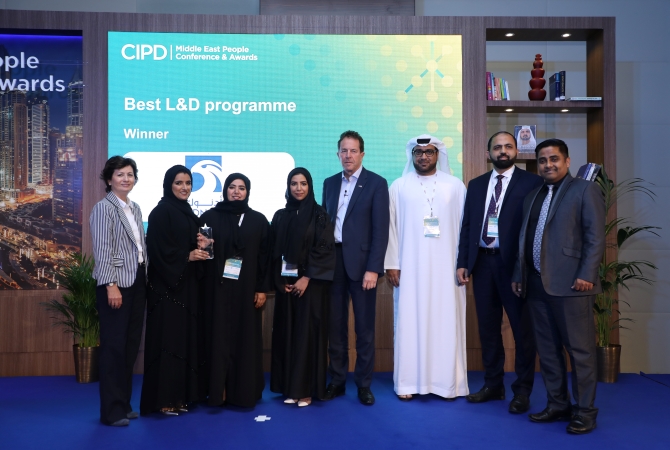ADNOC's award-winning L&D Programme
Last year, ADNOC took home the coveted CIPD Middle East People Award for the ‘Best L&D Programme’. Learn more about what made them stand out.
Last year, ADNOC took home the coveted CIPD Middle East People Award for the ‘Best L&D Programme’. Learn more about what made them stand out.
At the inaugural CIPD Middle East People Awards, ADNOC was awarded in the ‘Best Learning & Development Programme’, a category which received over 25 entries – proof that the region is increasingly focusing on upskilling its workforce for the future world of work.
Competing with Commercial Bank of Dubai, Cleveland Clinic Abu Dhabi, WSP, McDermott and AFAQ Leadership in the final round, ADNOC unanimously won with the successful implementation of its Learning Academies, launched in partnership with the business.

What were some of the key elements that made their initiative stand out?
ADNOC put a strong emphasis on creating an agile and progressive organisation where learning, innovation, knowledge-sharing and collaborative decision-making are embedded. Over the years, the UAE oil giant showed its continuous commitment to investing in, and cultivating, young Emiratis’ professional development and building the next generation of leaders through the set up of learning academies, the number of employees currently undergoing professional certifications and numerous initiatives.
At ADNOC, employee development is seen as a shared responsibility between employee, line management, training teams and functional subject matter experts. The training and development teams work closely with line management and employees in order to find out the best solutions to encourage learning.
Recognising the need for a broader learning experience for their employees and the importance of greater knowledge transfer between teams, the team decided to set up Learning Academies – a platform that would enable the organisation to tap into the employees’ vast knowledge and improve the learning experience leveraging technology. The onus was on developing a tool that would blend modern learning techniques such as e-learning and experiential learning with more traditional instructor-led classroom hours.
But ADNOC didn’t just draw on the expertise of its learning team. Instead, they engaged with the business throughout the entire process. From identifying the need for a structured intervention to implementing the Academy and enrolling students, different business stakeholders were actively involved through meetings, focus groups and other initiatives. They partnered with subject matter experts to develop and deliver learning solutions that could build the competence in technical areas and facilitate behavioural learning. Most critically, the L&D team partnered with line managers and employees to ensure buy-in and effective implementation. The Learning Academies shifted the responsibility of learning from HR and L&D to employees and their line managers for the success of learning programmes that led to good participation and high completion levels throughout the programme – also bringing a sense of empowerment and ownership, critical to long-lasting buy-in.
As a result of this partnership, three Learning Academies were fully established in 2018.
One of the key reasons for the success of this initiative was that clear overarching objectives were defined, and specific metrics were set to measure the effectiveness of the Academies – and draw from the lessons learnt for future initiatives.
In line with ADNOC’s integrated 2030 Strategy, the UAE oil giant has been going through major organisational changes. As the company continues to become more competitive and performance-led, finding ways to develop behaviours in line with ADNOC values while relentlessly developing functional and technical capabilities was critical. The Learning Academies were recognised as a crucial first step in creating a next-generation curated learning environment for behavioural, technical and functional skill development.
Specific objectives were then set for the Learning Academies. From enhancing performance to controlling costs and enabling learning, they were all clearly defined and the success of the Academies was measured against it.
However successful, any initiative leaves room for improvement – and being able to draw lessons from those and identifying success factors, so as to replicate and amplify their success, is critical. Here are five lessons learnt from ADNOC Learning Academies:
Drawing from these lessons and success, ADNOC is planning to launch an additional 4 academies for specific skills.
ADNOC won the Best L&D Initiative at the CIPD Middle East People Awards in 2019. Enter your nominations for one of 13 categories and stand a chance to be recognised by the professional body for HR: www.cipdawards.com
Are you a journalist looking for expert commentary and insights on the world of work?

18 Jun, 2024
A recap of our busiest Festival of Work to date
Championing better work and working lives
At the CIPD, we champion better work and working lives. We help organisations to thrive by focusing on their people, supporting economies and society for the future. We lead debate as the voice for everyone wanting a better world of work.